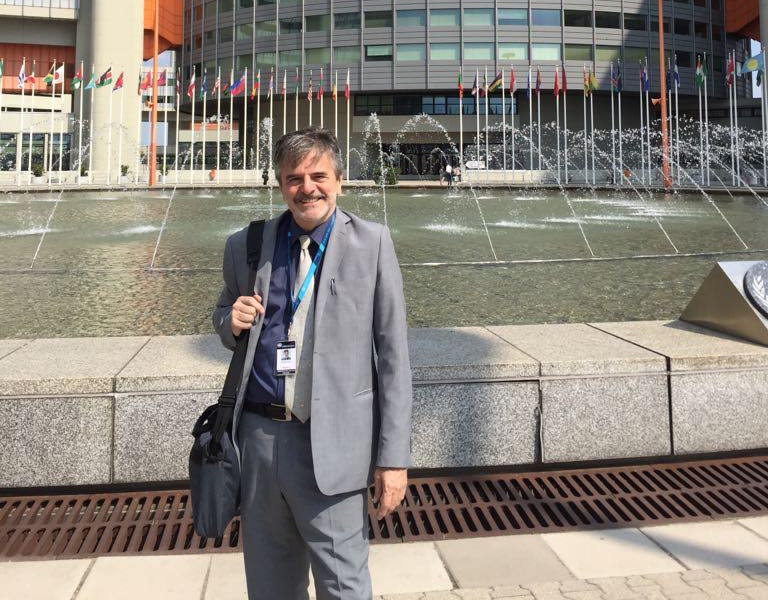The UNISPACE+50 conference is of great significance, addressing a crucial juncture in the crisis of growth that civilization is experiencing. Only an outlook for long lasting cultural and socio-economic growth will properly mitigate social imbalances and fears, and act as the leading factor for peace.
The development of the NewSpace sector, which is triggered by the advent of reusable rockets, new materials and processes, including additive layer manufacturing technologies, is quickly generating a unique industrial and cultural revolution. This remarkable paradigm has the inherent capacity of ensuring the right to development for all Earthlings, as was stated by the UN “Declaration on the Right to Development” in 1986. In progressively shifting the context and burden of industrial development outwards from the Earth’s surface, it will also support the goals of the UN Agenda 2030 for Sustainable Development. This important potential describes the social perspective that we have called the “Space Renaissance”.
We greet with enthusiasm the announcement that UNISPACE+50 welcomes the participation of NGOs, including Space Renaissance International, an organization that promotes expansion into space, as a means to reverse the global crisis and ensure the continuation and progress of civilization.
We take this opportunity to renew our most urgent recommendations: that the United Nations act within all their means to support the immediate prospect of the industrialization of Earth orbit and of geolunar space; based on a long-term strategy that includes the human expansion, and extension of civil rights, into outer space. In such a strategy the following leading objectives should be pursued:
- Low-cost, safe and comfortable transportation of civilian passengers in space, and protection of their life and health during travel and while working and living in space;
- The development of technologies for the recovery and recycling of space debris, as a high priority;
- The developing of construction technologies in-orbit, along with dedicated programs for their in-orbit validations to be initiated at the earliest phase;
- The exploitation of asteroids and planetary resources — which could eventually enable the construction of large rotating infrastructures in geolunar space — building on upcoming initiatives and programs (e.g. cislunar Deep Space Gateway, Moon Village), in order to allow permanent living and working conditions in bespoke space settlements.
- Encourage the definition and adoption of national laws for the avoidance of any further proliferation of space debris and the removal of existing space debris and wreckages;
- Promote the sharing, within the leading industries of the NewSpace sector, of the best practices for the creation of virtuous supply chains;
- Support national policies favorable towards NewSpace companies, through various incentives, making the sector’s industries competitive, and leading to the hiring of both young graduates and expert personnel;
- Encourage the creation of thematic investment funds suitably designed to support the development of the NewSpace industry.
We believe that these plans could significantly advance notable objectives in working towards the scope of a full maturity. The engagement of the United Nations for a creative paradigm, would uphold international cooperation in space and enhance the universal benefits of space activities for humankind. It is of paramount importance that the United Nations supports the NewSpace community in creating a virtuous circle, with the involvement of new actors that will enable both public and private investments for civil activities in space.
In conclusion Space Renaissance International recommends the United Nations fully inform the veracity and coherence of the existing and guiding principles of space law vis-à-vis the new kind of space activities and the multitude of actors involved (being both public, private, governmental and non-governmental platforms). Within this context, the Outer Space Treaty, which had recently celebrated the 50th anniversary, is universally recognized as primary basis and equitable foundation of space activities. Considering that various interpretations are now being developed at national level, it is becoming very apparent that appropriate and inclusive global governance structures could ensure the adequate exploitation of extraterrestrial resources by ensuing commercial and private activities. In this way supporting the effective enterprises of the NewSpace economy, in developing plans to conduct commercial activities in outer space, on the Moon, asteroids and other celestial bodies.
This letter was handed to about 200 participants to the UNISPACE +50 conference, at UN Centre in Wien, from 18 to 20 June 2018. Adriano Autino pronounced a brief recommendation, during the “Space and Civil Society” plenary session, the June 19th: watch here a videorecorded clip and the full transcript. We’ll come back soon, with a summary report from the conference.









 Space Renaissance France (French Chapter of SRI)
Space Renaissance France (French Chapter of SRI)  Space Renaissance USA, Inc. (USA Chapter of SRI)
Space Renaissance USA, Inc. (USA Chapter of SRI) Space Renaissance (Italian Chapter of SRI)
Space Renaissance (Italian Chapter of SRI) Space Renaissance Academy
Space Renaissance Academy Space Renaissance Initiative Group
Space Renaissance Initiative Group